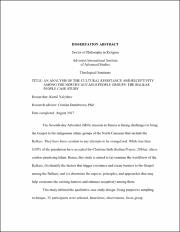| dc.description.abstract | The Seventh-day Adventist (SDA) mission in Russia is facing challenges to bring the Gospel to the indigenous ethnic groups of the North Caucasus that include the Balkars. They have been resistant to any attempts to be evangelized. While less than 0.05% of the population have accepted the Christian faith (Joshua Project, 2016a), others confess practicing Islam. Hence, this study is aimed to (a) examine the worldview of the Balkars; (b) identify the factors that trigger resistance and create barriers to the Gospel among the Balkars; and (c) determine the aspects, principles, and approaches that may help overcome the existing barriers and enhance receptivity among them. This study utilized the qualitative case study design. Using purposive sampling technique, 22 participants were selected. Interviews, observations, focus group discussions, and documentary research were done to find answers to the three research questions. In examining the Balkar worldview, the cognitive, affective, and evaluative dimensions were analyzed and dominant categories such as (a) mountain orientation, (b) past orientation, (c) group-oriented life, (d) transcendent God and the supernatural world, (e) honor and shame, and (f) striving for justice were identified. Five themes and 17 categories revealed the factors that hinder the SDA mission among the Balkar people. The culture of honor and shame, power of group thinking, trauma caused by the deportation, and institutional barriers provoke the resistance to the Gospel. The Balkars? protection of their cultural identity was identified as one of the main and connecting trigger-factors that caused antagonism to any influence. Despite negativity to any attempts of evangelization, 5 themes and 13 categories come up to neutralize resistance and enhance receptivity among the Balkars. Encountering the divine power, sociocultural neutralizing agents, healing of pain, focusing on mission among unreached people groups, and the contextual approach in developing strategies and methods are key elements for effective mission among the Balkars. This study recommends investing church resources into mission among hard-to-reach people groups, contextualizing the church structure and theology, observing God?s footprints inside the target audience, focusing on personal spiritual formation and discipleship process, and applying innovative and creative approaches into cross-cultural ministry. By doing such, the SDA Church can develop effective cross-cultural communication in the Muslim context of the North | en_US |

